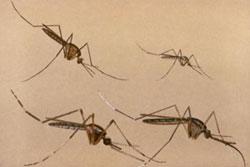General Information about Mosquitoes

Almost everyone has had the unpleasant experience of being bitten by a mosquito. Mosquito bites can cause skin irritation through an allergic reaction to the mosquito's saliva - this is what causes the red bump and itching. But a more serious consequence of some mosquito bites may be transmission of serious diseases and viruses such as malaria, dengue virus, Zika and West Nile virus, which can lead to disabling and potentially deadly effects (such as encephalitis, meningitis and microcephaly). Read more about diseases carried by mosquitoes.
Not only can mosquitoes carry diseases that afflict humans, but they also can transmit several diseases and parasites that dogs and horses are very susceptible to. These include dog heart worms, eastern equine encephalitis and West Nile virus.
There are about 200 different species of mosquitoes in the United States, which live in specific habitats, exhibit unique behaviors and bite different types of animals. Despite these differences, all mosquitoes share some common traits, such as a four-stage life cycle (egg, larva, pupa, adult).
Different species of mosquitoes prefer different types of standing water in which to lay their eggs. The presence of beneficial predators such as fish and dragonfly nymphs in permanent ponds, lakes and streams help keep these bodies of water relatively free of mosquito larvae. However, portions of marshes, swamps, clogged ditches and temporary pools and puddles are all prolific mosquito breeding sites. Other sites in which some species lay their eggs include:
- tree holes,
- old tires,
- buckets,
- toys,
- potted plant trays and saucers,
- plastic covers or tarpaulins and even
- places as small as bottle caps!
Some of the most annoying and potentially dangerous mosquito species, such as the Asian tiger mosquito, come from these sites.
To control mosquito populations and help prevent the spread of diseases they can carry, learn how to prevent mosquitoes by:
EPA and the Centers for Disease Control and Prevention (CDC) work closely with each other and with other federal, state, and local agencies to protect the public from mosquito-borne diseases such as Zika and the West Nile virus. CDC, working closely with state and local health departments, monitors the potential sources and outbreaks of mosquito-borne diseases and provides advice and consultation on prevention and control of these diseases. EPA ensures that state and local mosquito control departments have access to effective mosquito control tools that they can use without posing unreasonable risk to human health and the environment.
State and local government agencies play a critical role in protecting public health from mosquito-borne diseases. They serve on the front line, providing information through their outreach programs to the medical and environmental surveillance networks that first identify possible outbreaks. They also manage the mosquito control programs that carry out prevention, public education and vector population management. These agencies determine if the use of pesticides for mosquito control is appropriate for their area.
Learn more about:
